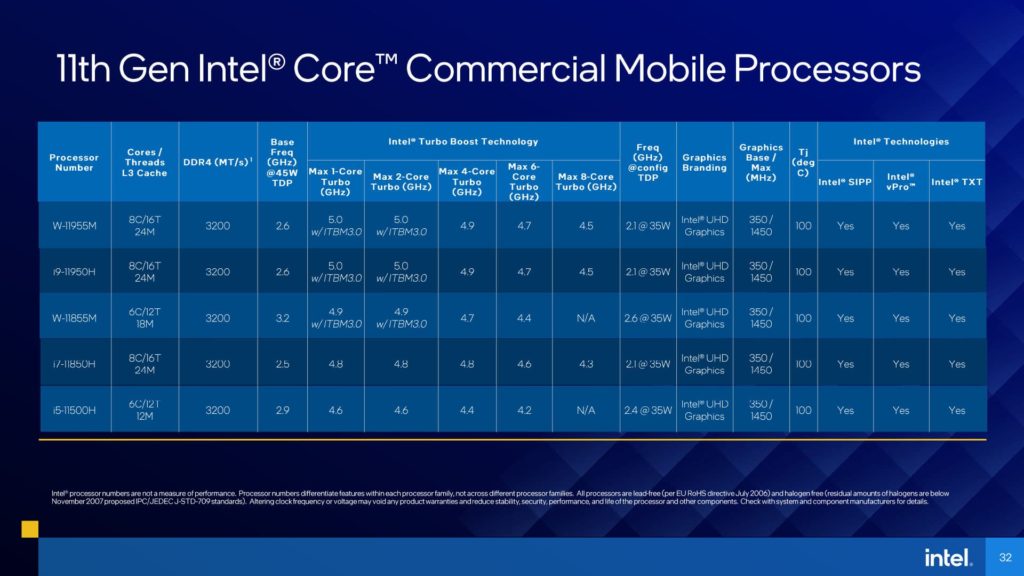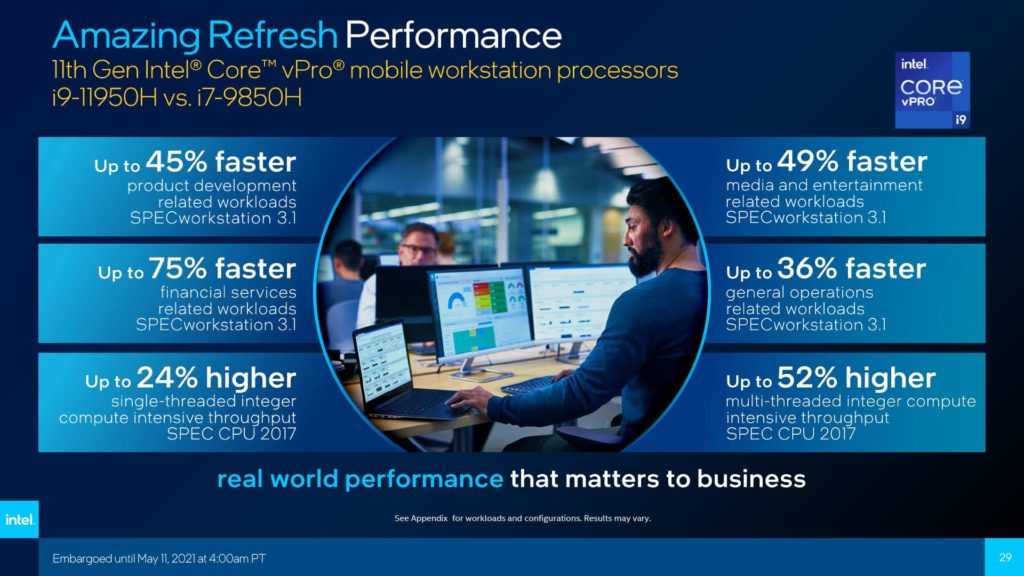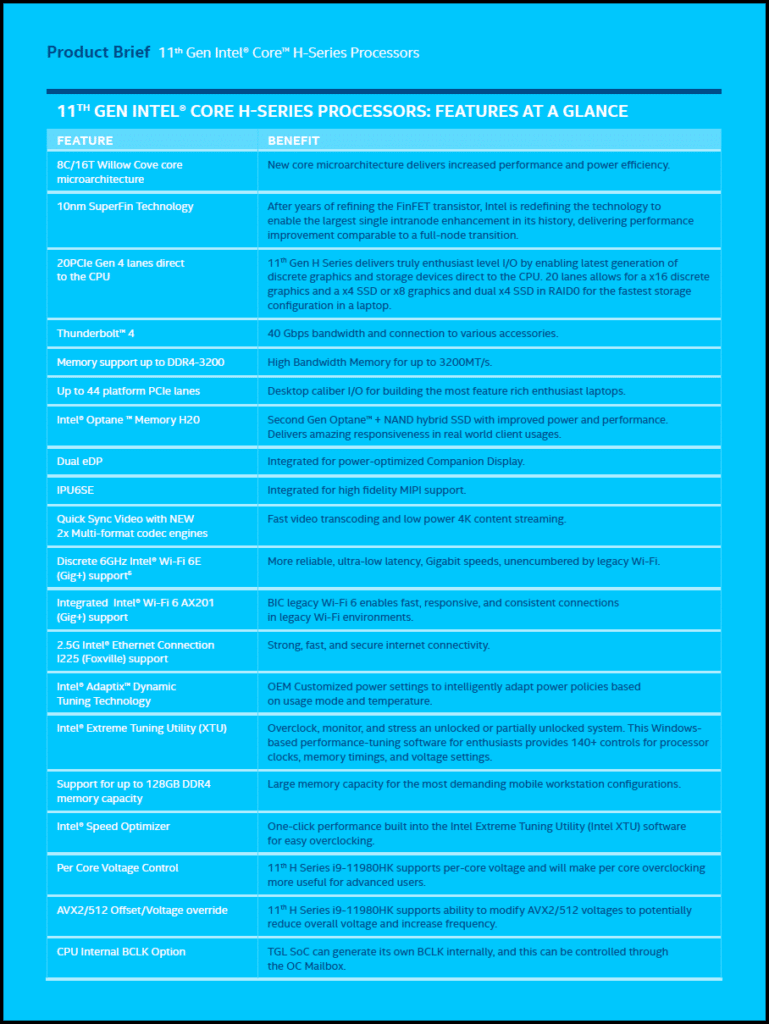Performance
In terms of performance, these mobile CPUs are designed for it. Intel claims the i9-11980HK is the world’s best gaming laptop processor. The i9-11980HK is fully unlocked. It supports Intel Extreme Tuning Utility so that enthusiasts can overclock it. It also has Intel Speed Optimizer for easy overclocking. It supports Intel Turbo Boost 3.0 as well. It has 20 PCIe Gen 4 + 24 PCIe Gen 3 lanes. It supports the latest third-party discrete graphics. It has Intel RST for Bootable RAID0 off the CPU and is ready for Windows Direct Storage.
In Intel’s own gaming benchmarks, it shows advantages between 5%-21% better game performance compared to last-gen depending on the game. Intel also goes on to show that compared to the Ryzen 9 5900HX between 11%-26% better game performance is experienced with the new i9-11980HK. Even the i5-11400H vs AMD Ryzen 9 5900HS is generally faster in gaming according to these graphs.
Content Creation
In terms of content creation the Intel Core H-series Processors are also capable. They have the integrated Xe architecture graphics with 32 EU’s. This allows 4K60 video handling with Intel Quick Sync Video with dedicated AV1 hardware decode. They also allow 360Hz FHD panels and 4K 120Hz panels.
Mobile Workstation
The workstation-class Xeon mobile CPUs are also part of the 11th Gen Intel vPro Platform. You will find the H-series and Xeon W-11000 Mobile Workstations. The Xeon platform for workstations supports ECC memory, Intel Hardware Shield, Intel Total Memory Encryption, Intel Active Management Technology, Intel Deep Learning Boost, and Integrated Thunderbolt 4, and Wi-Fi 6/6E.
11th Gen Intel Core Consumer Mobile Processors

Now we come to what the entire lineup looks like. First is the Intel Core Consumer Mobile Processors. At the very top is the i9-11980HK and H. Both of these CPUs are 8c/16t CPUs with 24MB of L3 Cache. They both support DDR4 officially at 3200MHz. The i9-11980HK has a Base Frequency of 2.6GHz. It has a Max 1-Core and Max 2-Core Turbo Frequency of 5GHz. It has a Max 4-Core Turbo of 4.9GHz and a Max 6-Core Turbo of 4.7GHz and a Max 8-Core Turbo of 4.5GHz. The i9-11900H basically has has frequencies 100MHz less than these on each, with an 8-core Max of 4.4GHz. The HK version is configured for 3.3GHz at 65W TDP and the H version is 2.1GHz at 35W.
Next down the line is the i7-11800H which is also an 8c/16t CPU with 24MB of Cache and also uses DDR4 3200MHz. This is a 1.9GHz at 35W CPU. The base frequency is 2.3GHz and it operates at 4.6GHz 1 and 2-Core Max. Max 4-Core is 4.5GHz and Max 6-Core is 4.4GHz. Max 8-Core is 4.2GHz.
The two i5 CPUs are 6c/12t CPUs with 12MB of Cache each at 3200MHz DDR4. The 11400H is 2.2GHz at 35W and the H is 2.1GHz at 35W. The 11400H has a base frequency of 2.7GHz, can boost to 4.5GHz on 1 and 2 Cores, and then at Max 6-Core is 4.1GHz. The 11260H is basically 100MHz behind that one.
All CPUs use the new Intel UHD Xe Graphics at a base of 350MHz and a max of 1450MHz. They all also have a Tj Max of 100c on temperature before throttling.
11th Gen Intel Core Commercial Mobile Processors

After the consumer mobile processors is the 11th Gen Core Commercial Mobile Processors. These CPUs differ in that they support Intel Workstation class features such as Intel SIPP, Intel vPro, and Intel T X T.
The Final Points

Intel is on a roll this year, and now its 11th Gen Core CPUs make a lot more sense as we see the plan fill to fruition on the desktop and mobile side of things. What we can say about this launch is that we are glad to finally see much unification between desktop and mobile platforms this generation.
With Intel’s 11th Gen Rocket Lake CPUs, it truly is a next-generation CPU utilizing Cypress Cove Cores. Even though it is squeezed into a 14nm package, the architecture itself is next-gen and we saw that in our CPU benchmarks on the i5-11600K and i9-11900K. In such a manner, the mobile lineup also is based on the new Willow Cove cores, but benefits even more as they are on a proper new 10nm SuperFin node. They are able to hit some pretty high frequencies for mobile CPUs, boosting as high as 5GHz on 1 or 2 cores, that’s pretty impressive. Even the all-core frequency looks good. If Intel can pull this off without throttling, and without power demand going crazy, it will be a great feat indeed. Tiger Lake is really the showcase for what Rocket Lake should have been, or could have been. Both also utilize the Intel Xe integrated UHD graphics.
At any rate, we have yet to test any Tiger Lake CPUs ourselves, so we cannot attest to the claims Intel is making about performance versus the AMD equivalent. We will have to see how that pans out in the real world and would love to get our hands on both mobile platforms to directly compare. On paper, Tiger Lake-H looks great, but when put to the test, will they hold up? We’ll have to see how that works out over time.














